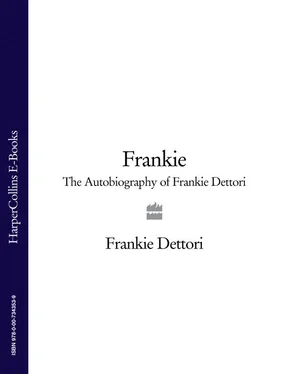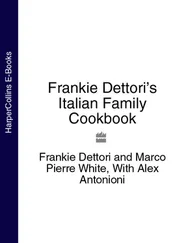That’s where my dad stepped in. He must have been mad too, because in addition to grooming Prince Paddy he decided to ride him at exercise. Young, fearless, and frustrated at the way things were turning out, he ended up begging to ride the one horse in the place that terrified everyone who came near it. People at the track feared the worst when he led the beast out of the stable and jumped onto its back. They all assumed it would be only a matter of time before my dad was sent crashing to the ground. Instead the pair hacked round together at a gentle pace as though they’d done it a thousand times before. It was the same when they teamed up again the next morning.
So that was how my dad started in racing. Eventually he partnered Prince Paddy every day, got his licence and rode the horse in his first race. To general amazement they won. My dad had experienced a very tough upbringing and believes the hunger and anger inside fired his ambition. By the time he reached twenty-one he had managed only five winners, three of them on Prince Paddy—yet within four years he was champion of Italy. Once he got there he was never going to throw it away. He was the best. No question.
Three of his brothers followed him into racing. Sergio became a very successful jockey too, with upwards of 1,500 winners and still rides a little bit while concentrating on his new career as a trainer. Sandro was also a jockey and is still involved as head lad to a trainer in Pisa. Pepe worked for years as a groundsman for the Italian Jockey Club. Salvatore was the outrageous one of the family. I don’t recall ever meeting him—which is a shame because everyone says he was a lovely bloke. He was strong as an ox but never really channelled his energy in the right direction. Instead he became an alcoholic and died in 1996 when he choked on his own vomit.
As a young jockey my dad was so disciplined that he was in bed at nine every evening, his jodhpurs laid out nearby without a single crease in them, ready for an early start in the morning. You could say he was single-minded to the point of obsession, and who could blame him. For years he’d been toiling away in filthy jobs for meagre reward, and unlike a lot of young jockeys with easy money in their pockets he wasn’t in a hurry to throw it all away.
It was the time of Molvedo, who followed in the hoofbeats of the mighty Ribot a few years earlier by winning Europe’s greatest race, the Prix de l’Arc de Triomphe, for Italy. Initially Dad was second jockey to Ribot’s rider Enrico Camici. He learned much from Camici, but when he became champion he forged a strong alliance with the trainer Sergio Cumani in Milan—which, by then, was becoming the centre of Italian racing.
My parents married after a whirlwind romance that began when my father visited a travelling circus in Milan. His Saturday nights were spent with his friends either at the cinema or at the Circo Russo—which stretched to a pair of camels, a few monkeys, three or four lions and a resident clown. That evening he chose the circus, chiefly because it was next to the racecourse, and was immediately captivated by a gorgeous young girl in the ring with long black hair all the way down to her calves. She had a variety of roles that evening, including trapeze artist, contortionist, juggler and balancing athletically on the backs of two horses, one leg on each, with reins in her hands as they cantered side by side around the tight circus ring. She was also tied to a rotating wheel of fortune while some idiot wearing a headband threw knives at her!
Sitting in the front row, smartly turned out in a suit and tie, his brand new Vespa parked outside the big top, my dad couldn’t take his eyes off this girl. For him it was a case of love at first sight. My mother’s name is Iris Maria, but everyone calls her Mara. She was only sixteen that fateful night, like a rose about to bloom, and Dad made a point of meeting her afterwards. She had spent her entire life on the move with the rest of the family in the circus which originally came from Russia. They lived like a travelling band of gypsies. My dad pursued her relentlessly, swept her off her feet, and they were married a few short months later in 1963.
They were like two pigeons cooing at each other for sure. Theirs was a grand passion, but it was not an easy marriage because my mum had only known life on the road with the circus. She hardly ever attended school because she was always moving on to the next venue. As a result she can hardly read or write. We never did discover the identity of her father, but my grandmother Secondina, who never married, was one of two sisters who suffered terrible injuries to their legs when a caravan toppled over onto them when they were young children. Her sister was called Terzilla and their elder brother Primo. They all lived a nomadic life, earning peanuts and living in caravans as the circus rolled on from town to town each week.
My uncle Claudio was the resident clown. With a big belly and white tee-shirt he’s the spitting image of Onslow from the TV programme Keeping Up Appearances. Claudio was offered a house by his local council, but he was so used to life on the road that he turned it down to continue living in his own spartan caravan.
Once my parents married, my mother’s days as a trapeze artist were over. She was totally fearless then, but now she can’t bear to travel to England to see me because she’s frightened of driving through the Channel Tunnel and even more terrified of flying. It’s got to the stage where she won’t even go up an elevator in a department store. So I keep in touch by phone and try to visit her whenever I am in Italy.
My sister Alessandra (who we call Sandra) was born in 1965. I followed five years later. Dad wanted my name to be as similar as possible to his. At first he considered calling me Gianfranco too, but eventually decided that if I became a jockey then Gianfranco Dettori junior was too much of a mouthful. So Lanfranco it was, although everyone in England has been calling me Frankie for years. I’ve inherited my suppleness and athleticism from my mother—and, of course, the agility and balance to carry out my trademark flying dismount. From my dad came the drive and desire to make it to the top.
By the time I was born on 15 December 1970 my parents’ marriage was virtually over. I learned much later that at the time of my birth my father was away riding that winter in Australia and he was already involved with Christine, who eventually became my stepmother. They had met that August when he was riding in Deauville. From the start she shared his ambition and he must have known that his marriage to my mother was coming to an end even before I was born.
One of the problems was that my mother hated horseracing. To her it is a stupid pastime. She is a lovely person, beautiful, though completely down to earth, and having given up the nomad’s life she couldn’t settle to domesticity. She never really understood what drove my father—and later me—to devote our lives to making horses run as fast as they possibly can. He would come home full of himself explaining that he’d won the big race, and she’d reply ‘What race?’ In those days it was important for him to have someone who could share and enjoy his achievements and my mum couldn’t do that.
Nor did she appreciate the strict disciplines involving my father’s weight, so he could never be sure his supper would be on the table each evening at 6.30 after a long day’s work. My father was so single-minded in his pursuit of success that he became more and more well-known and eventually my mum was being left behind. She loved him for who he was, not for the fact that he was the most famous jockey in Italy. By becoming so successful he needed somebody to take him further, and perhaps my mum wasn’t educated enough to take the next step with him. She preferred to retain her simple lifestyle as a housewife and couldn’t cope with the fame that came with all his high-profile winners. I don’t blame her for that. It’s just the way she is.
Читать дальше












